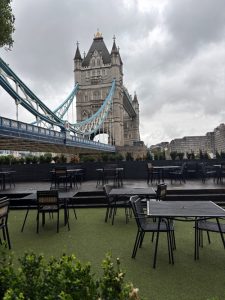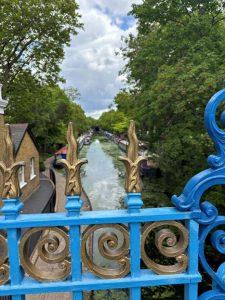
Travel can open doors to adventure, connection, and new experiences—but for those living with post-traumatic stress disorder (PTSD), it can also stir up anxiety and overwhelm. Unfamiliar environments, large crowds, or even a delayed flight can feel triggering. The good news? With preparation, support, and the right tools, safe and enjoyable travel is absolutely possible.
As trauma-informed therapists in North Carolina, we’ve helped many clients learn to travel with greater confidence. Below, we’ll share practical, therapist-recommended strategies to help you prepare for travel with PTSD – plus how telehealth therapy can support you even when you’re on the go.
What Is PTSD? Signs and Symptoms You Should Know
 Post-traumatic stress disorder (PTSD) is a mental health condition that can develop after someone experiences or witnesses a traumatic event. While often associated with military combat, PTSD can also arise from experiences such as sexual assault, car accidents, natural disasters, systemic oppression, or ongoing abuse.
Post-traumatic stress disorder (PTSD) is a mental health condition that can develop after someone experiences or witnesses a traumatic event. While often associated with military combat, PTSD can also arise from experiences such as sexual assault, car accidents, natural disasters, systemic oppression, or ongoing abuse.
PTSD doesn’t look the same for everyone, but some common symptoms include:
- Intrusive memories or flashbacks that feel like reliving the trauma
- Avoidance of people, places, or activities that serve as reminders
- Hypervigilance or feeling “on edge” (startling easily, difficulty relaxing)
- Changes in mood such as irritability, anger, shame, or emotional numbness
- Sleep challenges including nightmares or insomnia
- Difficulty concentrating or feeling disconnected from the present
When traveling, many of these symptoms may become more intense. New surroundings, unpredictability, and reduced access to support networks can amplify the nervous system’s stress response. That’s why preparation and compassion are key.
How PTSD Symptoms Can Affect Travel
For many people, traveling is exciting! But for those living with PTSD, the unfamiliarity and unpredictability of travel can make symptoms flare up. Triggers often show up in new or crowded environments, which can leave the nervous system feeling overwhelmed and unsafe.
Here are some ways PTSD symptoms may specifically impact travel:
- Intrusive memories or flashbacks: Airports, crowded buses, or loud noises (like fireworks or construction) may resemble aspects of past trauma and lead to sudden re-experiencing.
- Avoidance behaviors: Someone might cancel a trip, skip certain activities, or avoid specific places (like busy stations or unfamiliar neighborhoods) to prevent feeling triggered.
- Hypervigilance: Traveling can heighten the sense of being “on guard,” especially in new settings. This can lead to difficulty relaxing, enjoying the trip, or even sleeping.
- Emotional changes: Feelings of irritability, shame, or emotional numbness may make it harder to connect with travel companions or enjoy new experiences.
- Sleep disruptions: Changes in time zones, strange hotel rooms, or noise may worsen existing sleep challenges.
- Concentration difficulties: Planning routes, navigating airports, or even following a tour can feel exhausting when focus is already impacted.
Therapist tip: Experiencing symptom flare-ups doesn’t mean you can’t travel. It just means preparation, pacing, and supportive strategies are especially important.
Below are eight tips from a trauma-informed therapist in North Carolina for traveling with symptoms of or managing a diagnosis of PTSD.
Therapist-Recommended Strategies for Traveling with PTSD
 1. Prepare with Intention
1. Prepare with Intention
Travel can feel unpredictable, but small acts of preparation help create a sense of safety and control.
- Research your destination to anticipate what to expect (crowds, weather, cultural norms, transportation).
- Plan your itinerary with flexibility. Structure can be grounding, but build in downtime to avoid exhaustion.
- Share your plans with a trusted person so you feel supported from afar.
Therapist tip: Flying? Call ahead to request accommodations such as early boarding or access to a sensory-friendly waiting area.
2. Build a Travel “Coping Kit”
Think of this as your portable self-soothing toolbox. Pack items that bring comfort and regulation:
- Noise-canceling headphones or earplugs
- A small weighted blanket or scarf
- Essential oils or gum with grounding scents
- Fidget tools or sensory objects
- A playlist of calming music or guided meditations
- A journal or sketchbook to process feelings
Keep these items close in your carry-on so they’re always within reach.
3. Practice Grounding Skills Before You Go
When triggers arise, you’ll want coping skills ready to use. Practicing them beforehand helps them feel natural. Try:
- 5-4-3-2-1 grounding exercise (5 things you see, 4 you feel, 3 you hear, 2 you smell, 1 you taste).
- Box breathing (inhale 4, hold 4, exhale 4, hold 4).
- Progressive muscle relaxation to release body tension.
Building these skills into your daily routine before traveling will strengthen your confidence.
4. Choose Trauma-Informed Travel Options
You deserve to feel safe and comfortable when traveling.
- Pick your mode of travel carefully. Some people prefer driving because it offers more control, while others choose flying to shorten the stress.
- Book trauma-friendly lodging. Look for quiet rooms, secure locks, and private bathrooms. Don’t hesitate to request special accommodations.
- Travel off-peak when possible. This reduces crowds and overstimulation.
North Carolina tip: Amtrak’s Carolinian and Piedmont lines offer relaxing train routes that can feel less overwhelming than busy airports.
5. Establish Safety Anchors
Upon arrival at any new place, orient yourself by:
- Identifying exits and quiet spaces.
- Keeping essentials, like medication and grounding tools, easy to grab.
- Staying connected by checking in with a trusted person at home.
These “anchors” can help create a sense of familiarity even in new environments.
6. Communicate Your Needs
Advocating for yourself is a powerful act of healing. You don’t need to disclose details of your PTSD to request support.
- With hotels or airlines: Request quiet rooms, seating preferences, or early boarding.
- With companions: Share what helps when you feel triggered (space, grounding, or distraction).
- With yourself: Give permission to decline activities that feel unsafe.
Therapist tip: Practice phrases like “I need a moment outside” or “Can we choose a quieter spot?”
7. Incorporate Rest and Recovery
Travel can be overstimulating. Build in breaks to rest your body and nervous system:
- Schedule downtime between outings.
- Pack comfort items from home.
- Plan grounding rituals like stretching, tea breaks, or mindful walks.
Remember, rest is not a weakness. It’s part of trauma recovery.
 8. Have an Exit Plan
8. Have an Exit Plan
Knowing you have options can decrease anxiety.
- Identify safe ways to step away if overwhelmed.
- Keep emergency contacts accessible.
- Remind yourself: “If this feels like too much, I have choices.”
This mindset shift helps re-establish a sense of empowerment.
Can Telehealth Therapy Help While Traveling?
Therapy doesn’t necessarily have to pause when you travel. Many clients schedule virtual sessions while away to stay grounded and supported. However, you need to check with your clinician ahead of time, to ensure the clinician is able to provide services in the state you will be traveling to. Clinicians may need some time to reach out to their, and the other states, licensing boards to see if this is a possibility. So, please let your therapist know as much in advance as possible, so they can make arrangements and see if they are able to support you! If they are not licensed to practice where you are traveling to, your therapist can help you to make a trauma-informed plan for your travel as well.
At Be BOLD Psychology and Consulting, several of our therapist and psychologists are able to provide services in a variety of states, including therapy in North Carolina, South Carolina, and Virginia. Additionally, both Dr. Brittany Bate and Dr. Beth Curran hold the Authority to Practice Interjurisdictional Telepsychology (APIT) under the PSYPACT Commission E. Passport, which allows them to provide telepsychology services in up to 42 states – click here to see the PSYPACT map! This means you may be able to continue therapy while traveling, whether for a quick weekend trip or a longer journey.
For many clients, knowing their therapist is just a secure video call away brings tremendous peace of mind.
The Power of Self-Compassion in Recovering from PTSD on the Road
 Above all, remember to treat yourself with kindness. Traveling with PTSD isn’t about “doing it perfectly.” It is about doing it in a way that honors your needs.
Above all, remember to treat yourself with kindness. Traveling with PTSD isn’t about “doing it perfectly.” It is about doing it in a way that honors your needs.
- Celebrate the wins, big or small.
- Release comparison – your trip doesn’t need to look like anyone else’s.
- Acknowledge your resilience in showing up for new experiences.
Healing and joy can coexist with PTSD. Every trip you take is proof of your courage.
Quick FAQs About Traveling with PTSD
Can I travel if I have PTSD?
Yes. Many people with PTSD travel safely and meaningfully. The key is preparation – building a coping kit, practicing grounding strategies, and creating a travel plan that centers your needs.
What are common travel triggers for people with PTSD?
Triggers vary, but some common ones include crowded airports, loud noises, feeling trapped in enclosed spaces, sudden schedule changes, or unfamiliar environments. Identifying your personal triggers before travel can help you prepare for them.
Can traveling make PTSD symptoms worse?
Sometimes, but not always. Stress from travel may temporarily intensify symptoms like hypervigilance, anxiety, or trouble sleeping. However, with the right coping strategies and pacing, many people find travel empowering and even healing.
What if I get triggered while traveling?
Grounding skills are essential. Try the 5-4-3-2-1 exercise, deep breathing, or stepping outside for a sensory reset. If traveling with a companion, let them know how they can support you in these moments.
Should I tell airlines or hotels that I have PTSD?
You don’t have to disclose your diagnosis to receive support. You can simply request accommodations like quiet spaces, early boarding, or certain seating arrangements. Use language that feels comfortable for you.
Can I keep seeing my therapist while traveling?
Absolutely. At Be BOLD, our therapists provide telehealth across North Carolina. In addition, both Dr. Bate and Dr. Curran hold PSYPACT authority, meaning they can see clients virtually in up to 42 states. This can be a huge source of stability while on the road.
Final Thoughts: Safe and Empowered Travel Is Possible
 PTSD can make travel feel daunting, but with preparation, grounding strategies, and support, you can create meaningful and safe travel experiences. Whether you’re exploring North Carolina or venturing across the country, these strategies can help you feel more in control and empowered.
PTSD can make travel feel daunting, but with preparation, grounding strategies, and support, you can create meaningful and safe travel experiences. Whether you’re exploring North Carolina or venturing across the country, these strategies can help you feel more in control and empowered.
If you’d like extra support preparing for an upcoming trip, or if you’d like to explore therapy with a trauma-informed provider who understands PTSD, our team at Be BOLD is here for you. We have several clinicians with immediate availability for therapy for PTSD or therapy for trauma, including night and weekend appointments! We offer virtual therapy services to clients in North Carolina, Virginia, South Carolina, and the 42 PSYPACT States, as well as in-person sessions in Durham, North Carolina!
Take the first step today: Schedule your free 20-minute consultation with Be BOLD Psychology and Consulting. We’ll help you create a travel plan that centers your safety, your healing, and your joy. We look forward to supporting your travel dreams!

